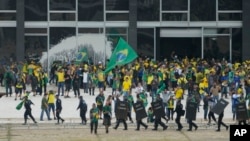Brazil’s Supreme Court unanimously voted Monday that the armed forces have no constitutional power to intervene in disputes between government branches, a largely symbolic decision aimed at bolstering democracy after years of increasing threat of military intervention.
The court's decision came in response to an argument that right-wing former President Jair Bolsonaro and his allies deployed in recent years. They have claimed that Article 142 of Brazil's Constitution affords the military so-called “moderating power” between the executive, legislative and judicial branches.
Bolsonaro presented this interpretation in an April 2020 meeting with his ministers, telling them that any of the three powers can request the armed forces take action to restore order in Brazil. In the years since, posters invoking Article 142 became a fixture at rallies calling for military takeover – and culminated in an uprising by Bolsonaro supporters seeking to summon the military to oust his successor from power.
All of the 11 justices — including both justices appointed by Bolsonaro — rejected that thesis.
While the constitution empowers the military to protect the nation from threats and guarantee constitutional powers, “that does not comport with any interpretation that allows the use of the armed forces for the defense of one power against the other,” the case’s rapporteur, Justice Luiz Fux, wrote in his vote.
Article 142’s vague wording had allowed room for some interpretation — although the one espoused by Brazil’s far right was “absolutely crazy,” said João Gabriel Pontes, a constitutional lawyer at Daniel Sarmento e Ademar Borges in Rio de Janeiro.
“This is not a Supreme Court ruling that will safeguard Brazilian democracy from new attacks,” Pontes said by phone. “However, it sends an important message to society that a military intervention has no constitutional basis.”
The constitution dates from 1988, three years after the country cast off its 21-year military dictatorship.
Bolsonaro’s 2018 election in a sense marked the return of the armed forces to power. The former army captain who openly waxed nostalgic for the dictatorship era appointed high-ranking officers to his Cabinet and thousands of active-duty service members and reservists to civilian positions throughout his administration.
For his 2022 reelection bid, he tapped a general as his running mate and tasked the military with auditing electronic voting machines whose reliability he cast doubt upon, without ever providing evidence. Following his defeat to leftist rival Luiz Inácio Lula da Silva, his supporters set up camp outside military barracks for months to demand military intervention.
Bolsonaro never conceded defeat nor asked them to demobilize, and on Jan. 8, 2023 they stormed the capital, Brasilia, invading and vandalizing the Supreme Court, Congress and the presidential palace.
Federal Police later confiscated the cell phone of Bolsonaro’s aide-de-camp and found conversations between close advisers and military officials debating whether conditions and the constitution allowed for military intervention. The seizure was part of an investigation into whether the former president and top aides incited the uprising to restore him to power. He has denied any involvement.
Debate over the constitutional role of the armed forces reflects “the historic vice of an institution that never conformed to subordinating itself to civil order,” and the court’s vote reaffirms what is clear from any constitutional law textbook, said Conrado Hubner, a professor of constitutional law at the University of Sao Paulo.
“Nothing has the power to avoid a coup in the future. Nothing," Hubner said. But the court's position helps to combat justifications for a coup, he said.
Meantime, Lula has endeavored to stay on good terms with the military’s top brass. Last week, he forbade any official events observing the 60th anniversary of the date the military deposed the president and ushered in Brazil’s dictatorship, on March 31, 1964.
Virtually all historians characterize it as a coup. Others disagree, including Bolsonaro’s then-vice president, Gen. Hamilton Mourão, who wrote Sunday on X that the date represents the day “the nation saved itself from itself!” and that history cannot be rewritten.
In his vote, Justice Flávio Dino wrote that “echoes of that past stubbornly refuse to pass,” and that the court’s decision should be forwarded to Lula’s defense minister for dissemination to every military organization in the country.
Doing so "would aim to eradicate misinformation that has reached some members of the armed forces,” Dino wrote. “Any theories that go beyond or distort the true meaning of Article 142 of the federal constitution must be eliminated.”




